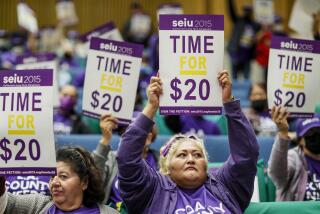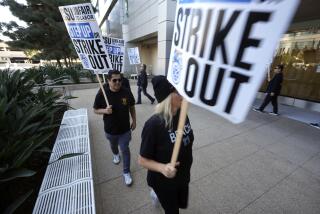Letters: Higher pay, more problems?
Re “Raise the minimum wage,” Editorial, Sept. 13
While I can understand (though disagree with) some of the arguments behind the “need” to raise the minimum wage in California to $10 an hour, one thing that concerns me is the never mentioned proportional value of skilled labor.
Every time the minimum wage is raised without a corresponding rise in wages for skilled labor, the proportional value of those skilled workers is lessened. And should employers feel the need to actually increase the skilled position wages as well as the minimum wage, wouldn’t that just raise the cost of living for all, negating the gains of the rise in wages that started the whole thing in the first place?
Hardy Pruuel
Torrance
I grew up in a large, poor family, so I definitely want workers to be paid a fair wage.
But people should be careful what they wish for.
Sure, hardworking low-income employees who are lucky enough to have a job would like higher wages. However, some marginal businesses won’t survive, and some workers will probably lose their jobs or face reduced hours.
Also, increased wages may cause some of the poor to no longer qualify for crucial benefits like subsidized school meals. Here’s one adverse effect we tax practitioners know about: Increased wages mean that many taxpayers will see their Earned Income Tax Credit reduced or eliminated.
Increased minimum wages will force businesses to increase their prices to maintain their profit margins. Remind anyone of the proverbial dog chasing its own tail?
Carl J. Horn
Twentynine Palms
ALSO:
Letters: The rise -- and fall -- of the U.S.
Letters: A moral dilemma on chemical attacks
Letters: What the recall vote in Colorado means
More to Read
A cure for the common opinion
Get thought-provoking perspectives with our weekly newsletter.
You may occasionally receive promotional content from the Los Angeles Times.










